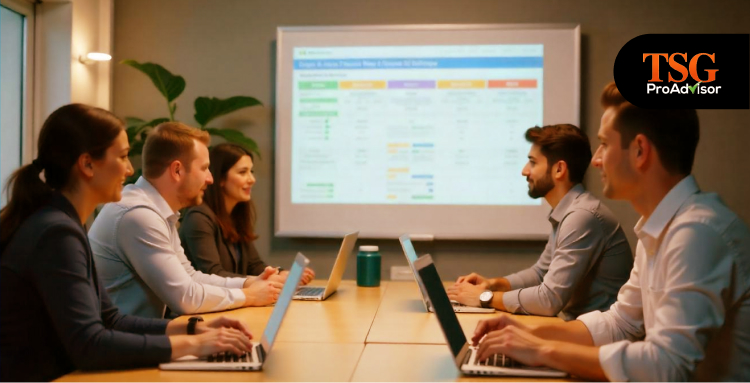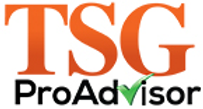Even the most experienced accountants can make mistakes. A misplaced decimal, a missed entry, or a misunderstanding of updated tax laws can throw your entire financial report off balance. These small slip-ups can lead to audits, penalties, and lost client trust. What’s worse? These errors often come from one simple cause: falling behind on industry changes and best practices.
In a field where accuracy is everything, relying on outdated knowledge is risky business.The solution? Regular, targeted training. In this article, we’ll explore why consistent training isn’t optional, it’s essential for accuracy that lasts.
1. Why Regular Training is Key to Accurate Accounting
In accounting, accuracy isn’t just about getting the numbers right, it’s about understanding the why behind them. Here’s how training ensures that you and your team stay current, confident, and informed:
-
Training Reinforces the Fundamentals of Accuracy
Regular training strengthens the core principles accountants rely on every day, from accurate data entry to interpreting financial statements with confidence. According to the Institute of Management Accountants (IMA), professionals who engage in ongoing education are significantly more likely to report higher levels of financial accuracy and efficiency compared to those who don’t participate in training.
-
Outdated Knowledge Leads to Errors, Training Prevents That
Tax laws, compliance regulations, and software features are always evolving. A significant portion of accounting errors is caused by professionals working with outdated systems or information. Without consistent training, even experienced professionals can fall into costly oversights.
-
Training Leads to Fewer Mistakes and Stronger Results
When training is part of the workflow, guesswork is replaced with clarity. Organizations that invest in continuous training for their financial teams experience fewer accounting errors and higher productivity.
2. Staying Updated with Evolving Standards
With tax rules and financial regulations always changing, accountants need to stay sharp. It is not just about staying accurate, but also about helping the business make better decisions.
-
Adapting to Changing Tax Codes, Financial Regulations, and Compliance Requirements
The U.S. Tax Code alone undergoes hundreds of changes each year, impacting everything from corporate deductions to individual tax rates. Similarly, financial reporting standards like GAAP (Generally Accepted Accounting Principles) or IFRS (International Financial Reporting Standards) are frequently updated to reflect changes in the economy or business practices. Missing these updates can lead to costly mistakes, audit issues, or even legal trouble.
-
The Critical Role of Training in Staying Up-to-Date
Ongoing training acts as the bridge between outdated practices and the newest standards in accounting. With regular updates, accounting teams can stay ahead of changes in tax codes, financial regulations, and industry practices, ensuring that their work is both compliant and efficient.
In fact, according to the American Institute of CPAs (AICPA), professionals who participate in at least 40 hours of continuing education per year are considered. They are significantly better adapted well the shifting regulatory landscape than those who are not.
-
Keeps your workflow efficient
Mistakes don’t just cost money. The truth is, they cost time. Fixing errors, tracking down discrepancies, and re-running reports all slow down your process. Accurate work from the start means smoother, faster operations across the board.
3. Mastering the Tools of the Trade
 Well-trained accountants can identify potential issues before they arise. Get your hands on these tools for ensuring smooth audits, accurate financial statements
Well-trained accountants can identify potential issues before they arise. Get your hands on these tools for ensuring smooth audits, accurate financial statements
-
Why Software Training Matters
Modern accounting runs on platforms like QuickBooks, Xero, and Sage. However, using them well takes more than basic know-how. Training helps professionals go beyond the surface, unlocking features like automation, custom reporting, and integrations that streamline daily tasks and boost accuracy.
-
Reducing Errors Through Tool Proficiency
When accountants fully understand their tools, they make fewer mistakes. Training minimizes manual data entry errors by teaching teams how to automate processes, catch discrepancies early, and work more efficiently. The result? Cleaner reports, faster workflows, and fewer compliance headaches.
-
Lack of standardized procedures
When team members follow different methods or rely on personal shortcuts, inconsistencies creep in. A clear, shared process keeps everyone on the same page and reduces the risk of things falling through the cracks.
4. Preventing Costly Mistakes Before They Happen
And let’s not forget how costly a mistake can be. Not just in money, however, in lost time, client trust, or your team’s confidence. Beware of these financial pitfalls, and avoid them with regular training:
- Training strengthens attention to detail, helping accountants catch small issues before they become major errors. With the right training in place, you’re giving your people the tools to work smarter, double-check less, and get things right the first time.
- Critical thinking skills improve through regular training, allowing professionals to analyze numbers more strategically, not just mechanically.
- Well-trained professionals are better equipped to spot inconsistencies like duplicate transactions, incorrect entries, or unexplained variances. Instead of reacting to problems, they’re equipped to prevent them.
- Early detection of red flags saves time and money, reducing the risk of audit complications, compliance failures, or reputational damage. A well-trained eye can spot inconsistencies early, before they turn into bigger problems.
- Training builds confidence under pressure, helping accounting teams remain accurate even during tight deadlines or complex reporting periods. Confident professionals are more decisive, efficient, and less likely to second-guess their work.
- Proactive learning creates a culture of accountability and precision, where team members are trained to question, verify, and validate every step.
5. Building Teamwide Consistency Through Training
 Consistency is the backbone of reliable accounting. And, relying too heavily on one person for key accounting tasks is a common vulnerability. Here’s how regular training resolves them:
Consistency is the backbone of reliable accounting. And, relying too heavily on one person for key accounting tasks is a common vulnerability. Here’s how regular training resolves them:
-
Creating a Unified Approach Across the Team
When every team member follows the same processes, the risk of confusion or conflicting records drops dramatically. Regular training ensures that junior staff to senior accountants are aligned on procedures, software use, and reporting standards. The team needs to understand the benefits of peer learning in the tax profession. This creates a shared language within the team, making collaboration smoother.
-
Cross-Training to Strengthen Flexibility and Reduce Risk
If one person is unavailable, deadlines can’t be missed. Otherwise, workflows are disrupted. Cross-training helps distribute critical knowledge across the team, so multiple people can step in when needed without compromising quality or accuracy. It builds resilience, reduces compliance risk, and ensures the entire department can function effectively, no matter who’s out of the office.
6. Making Training a Continuous Practice
Training shouldn’t be treated as a once-a-year obligation. To truly support accounting accuracy, it needs to become a built-in part of your workflow, not a disruption to it.
- Start small, schedule smart: Instead of carving out entire days for learning (which can boost productivity), integrate short, focused training sessions into your monthly or biweekly calendar.
Whether it’s a 15-minute webinar on regulatory changes or a quick tutorial on new software features, regular exposure keeps your team up to speed without overwhelming them. These are new trends and innovations in tax education.
- Use what’s already available: Major accounting software platforms like QuickBooks, Xero, and Sage frequently release free updates, tutorials, and certifications. Subscribe to their training newsletters, attend live demos, or explore user forums. Using these resources reduces the pressure to build a custom training program from scratch.
- Encourage team accountability: Create a shared space. Whether it’s digital or physical, your team can log completed trainings, recommend helpful resources, or flag areas they’d like to improve. When learning becomes part of the team culture, accuracy becomes a collective standard, not an individual effort.
- Most importantly, lead by example. When leadership takes training seriously, the rest of the team follows suit. Show that continuous improvement is part of your professional DNA, not just a checkbox on a list.
Conclusion: Accuracy Starts with Training
Consistent learning is what separates good accountants from great ones. With a growing library of expert-led courses designed specifically for accounting professionals, TSG Pro Advisor makes it easy without helming your schedule. Whether you’re looking to refine your core skills or explore advanced financial strategies, their programs are built to help you level up with clarity, flexibility, and real-world application.
So don’t wait for costly mistakes to expose a knowledge gap. Make training part of your monthly routine. Invest in your precision, and let us be your trusted partner in getting it right every time.


